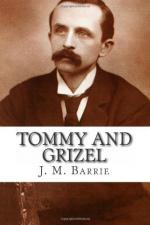Outside, the fog kept changing at intervals from black to white, as lazily from white to black (the monster blinking); there was not a sound from the street save of pedestrians tapping with their sticks on the pavement as they moved forward warily, afraid of an embrace with the unknown; it might have been a city of blind beggars, one of them a boy.
At eight o’clock Pym rose with a groan and sat down in his stocking-soles to write his delicious tale. He was now alone. But though his legs were wound round his waste-paper basket, and he dipped often and loudly in the saucer, like one ringing at the door of Fancy, he could not get the idea that would set him going. He was still dipping for inspiration when T. Sandys, who had been told to find the second floor for himself, knocked at the door, and entered, quaking.
“I remember it vividly,” Pym used to say when questioned in the after years about this his first sight of Tommy, “and I hesitate to decide which impressed me more, the richness of his voice, so remarkable in a boy of sixteen, or his serene countenance, with its noble forehead, behind which nothing base could lurk.”
Pym, Pym! it is such as you that makes the writing of biography difficult. The richness of Tommy’s voice could not have struck you, for at that time it was a somewhat squeaky voice; and as for the noble forehead behind which nothing base could lurk, how could you say that, Pym, you who had a noble forehead yourself?
No; all that Pym saw was a pasty-faced boy sixteen years old, and of an appearance mysteriously plain; hair light brown, and waving defiance to the brush; nothing startling about him but the expression of his face, which was almost fearsomely solemn and apparently unchangeable. He wore his Sunday blacks, of which the trousers might with advantage have borrowed from the sleeves; and he was so nervous that he had to wet his lips before he could speak. He had left the door ajar for a private reason; but Pym, misunderstanding, thought he did it to fly the more readily if anything was flung at him, and so concluded that he must be a printer’s devil. Pym had a voice that shook his mantelpiece ornaments; he was all on the same scale as his ink-pot. “Your Christian name, boy?” he roared hopefully, for it was thus he sometimes got the idea that started him.
“Thomas,” replied the boy.
Pym gave him a look of disgust “You may go,” he said. But when he looked up presently, Thomas was still there. He was not only there, but whistling—a short, encouraging whistle that seemed to be directed at the door. He stopped quickly when Pym looked up, but during the remainder of the interview he emitted this whistle at intervals, always with that anxious glance at his friend the door; and its strained joviality was in odd contrast with his solemn face, like a cheery tune played on the church organ.
“Begone!” cried Pym.
“My full name,” explained Tommy, who was speaking the English correctly, but with a Scots accent, “is Thomas Sandys. And fine you know who that is,” he added, exasperated by Pym’s indifference. “I’m the T. Sandys that answered your advertisement.”




